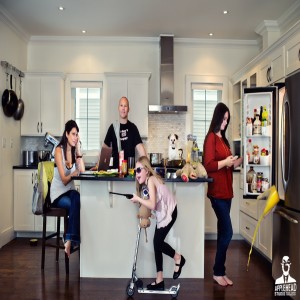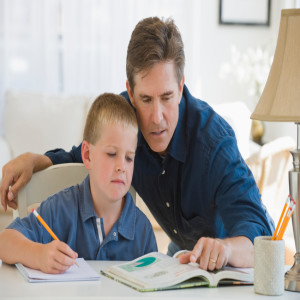
4.8K
Downloads
307
Episodes
Parenting is the most important job we have for which we almost never have any training. This podcast offers glimpses into effective parenting choices and communication
Parenting is the most important job we have for which we almost never have any training. This podcast offers glimpses into effective parenting choices and communication
Episodes

Sunday Jan 31, 2021
Uncommon Senior Year, Balancing Act
Sunday Jan 31, 2021
Sunday Jan 31, 2021
More letters on parenting issues. My first mom is really concerned about her spiralling son whose senior year in high school is crashing because of the pandemic. Some thoughts, but also helping her consider getting him into therapy if things don't improve soon. Another letter is from "Freaked" who frets over balancing the needs and demands of her family, as they all stay-at-home. Encoourage detailed scheduling and balancing me-time with family demands.

Saturday Jan 23, 2021
How are you faring during the pandemic?
Saturday Jan 23, 2021
Saturday Jan 23, 2021
A year has passed since the first coronavirus infections in the United States. We are all finding our "new normal." Many listeners have been emailing me with questions about adjusting to this new normal in our lives. Today starts a new series on my podcast, where I will be sharing with you some of these letters and my responses. Today, mom laments changes in how she will celebrate her 6 year old's birthday party. Also, another letter decries all the changes in family functioning for everybody to get things done. Message me when you have questions of your own. I will respond personally and within a subsequent podcast. Blessings, Dr. Jon Robinson

Sunday Jul 12, 2020
It Takes A Village to School Your Child
Sunday Jul 12, 2020
Sunday Jul 12, 2020
Many kids feel banished to their rooms and not come out until that homework is finished "young man!!" Home schoolers can feel isolated throughout their school day. As parents, it is vital that your kids know that you are there for them as they struggle to complete assignments. Draw on and draw in other resources to bolster your child's homework and home schooling experience. As they find more creative, engaging, unique, and interesting ways to tackle assignments, with your oversight, school becomes more of fun experience. Help your kids use all of the resources at their disposal. Be the sounding board. Active listen when you see them being stuck. Be the cheerleader with their efforts and their success. It takes a village to school your child.

Sunday Jul 05, 2020
Reframe Failures as Blessings in Disguise
Sunday Jul 05, 2020
Sunday Jul 05, 2020
Everybody who has failed, raise your hand. Yep, that's everybody. If your hand's not raised, you are lying :( Interestingly, failure is a critical part of success. How can we know what's right, if we first don't know what's wrong? How you handle your failures provides a critical role model for your kids. How you help your kids deal with failure is a critical component in their building character. When you help them see that each failure is also a blessing in disguise, you help them build up steam to learn more.

Sunday Jun 28, 2020
Start with your child's strengths
Sunday Jun 28, 2020
Sunday Jun 28, 2020
Getting your child to embrace homework can be rough. Complaints, stall tactics, moaning and groaning can abound. After clearing the way with active listening and helping him get down to task, help him see and start with his strengths, what is shorter to complete, what he's good at. This strategy helps him build up a positive head of steam heading into the hard stuff. Find ways to break down the hard stuff into more time manageable pieces. Go for shorter work times with alternating break/fun times. With these successes, he will be better able to tackle the harder stuff.

Sunday Jun 21, 2020
Encourage a context for learning
Sunday Jun 21, 2020
Sunday Jun 21, 2020
Everything happens for a reason. If your child is not getting down to task as you directed, try to understand the context for his stalling. Such questions as, "What else is going on?" and, "Why now?" are good starters for conversation. Use your active listening to help him lower his emotional fever, and then help him problem solve before redirecting him to task. Understanding the context for his delay, and resolving his distraction, will clear the way for his focusing fully on the task at hand.

Sunday Jun 14, 2020
Developing Your Child's Growth Rhythm
Sunday Jun 14, 2020
Sunday Jun 14, 2020
As important as the 3R's of schooling are, and adding to the list the fourth "R," the goal of parenting our kids through their school experience is helping them build character and develop a growth rhythm. That's what serves them best in being all they can be as an adult. Being a good role model, helping them make good decisions, teaching them about putting their energies into what's most important are all ingredients to good character and a good growth rhythm. Our kids find 80% of their personality in their interactions with us, only 15% with their peers, and just 5% on their own. How we are with our kids will define how they will be with others. Are you up to the task?

Sunday Jun 07, 2020
Relationship, the 4th R of homeschooling
Sunday Jun 07, 2020
Sunday Jun 07, 2020
What kind of home school teacher are you? It's tough bouncing back and forth between being parent and teacher to our child.How do you navigate that? It is critical in this context to embrace the 4th R of schooling. The original 3Rs are reading, 'riting, and 'rithmetic. Most important, however, and the best context within which to teach the first 3Rs is the 4th R, relationship. Of course, as the parent, you are constantly aware of building your relationship with your child. As home schooling parent, you want to come from a position of earned authority for your new role. By understanding your child's school needs, wants, and feelings, you can better craft a learning experience for him. Therein lie multiple academic and life-based teachable moments.

Saturday May 30, 2020
Mutual respect sets the tone for schooling
Saturday May 30, 2020
Saturday May 30, 2020
When helping your child with schooling, balance your approach. As you can work with each other with mutual respect, the task becomes easier and quicker for each of you. Use your active listening to settle your child into task. Brainstorm options for task completion. Plan ahead and use a daily planner dry erase board so that your child knows what to expect each moment of each school day. Give clear, specific, and time sensitive for better cooperation. The more creative and unique you can make the tasks, and the more involved you can get your child in the process, the better the outcome.

Monday May 25, 2020
Tools for Academic Success
Monday May 25, 2020
Monday May 25, 2020
You wouldn't start a DIY project at home without the proper tools, would you? Of course not. Some parents, however, just let their kids do homework and home school willy nilly, whatever. There's a saying that applies here: For anything worth doing, you get out of it what you put into it. To help equip your child for academic success, give him the proper tools to get the job done. To create the habit of homework and home schooling, equip your child with structure and routine. Application of these tools consistently leads to their ultimate tool, muscle memory. Muscle memory enables your child to get it done without hassle, distraction, or excuses. It leads to greater efficiency on task and greater retention come test time. Structure, routine, and muscle memory are tools for academic success
